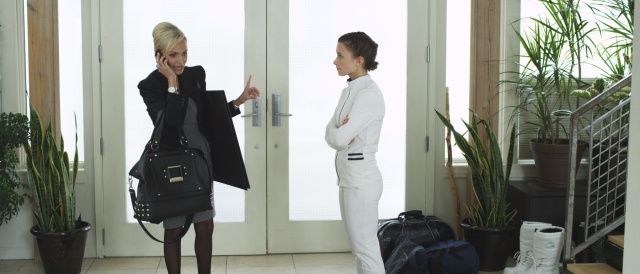Title; Family Weekend
Director: Benjamin Epps
Starring: Kristin Chenoweth, Olesya Rulin (‘High School Musical’) and Matthew Modine (‘The Dark Knight Rises’)
Teenagers and their parents often have difficulties understanding each other’s emotions, and often have trouble finding ways to connect with, and understand, each other. They often mask their disappointment over, and internally contend with, the fact that they can’t comprehend each other’s motivations. The strain between parents and teens is the main driving factor of the lead characters’ struggles in the new family-comedy-drama ‘Family Weekend,’ which marks the feature film directorial debut of Benjamin Epps. The main character in the film, 16-year-old Emily Smith-Dungy, is the prime example of a teenager who outwardly appears to be independent and determined to achieve her goals on her own. However, she actually becomes deterred by the lack of support from her parents and siblings, and isn’t afraid to use whatever means necessary to reunite her family.
‘Family Weekend’ follows Emily (Olesya Rulin), an incredibly motivated teenager who has grown increasingly frustrated with her parent’s lack of support and guidance. Her mother, Samantha (Kristin Chenoweth), is a career-focused, non-nonsense high-powered business executive. Her dad, Duncan (Matthew Modine), is a happy-go-lucky artist who can’t be bothered to earn a paycheck. When they miss their daughter’s important jump-roping competition, Emily reaches her breaking point and takes it upon herself to restore order in the house. With the help of her siblings, they unite and take their parents hostage in hopes of becoming a family again.
The Smith-Dungy’s sleek, ulta-modern house, where most of the kidnapping and Emily’s proposed family bonding takes place over the weekend, was stylishly created by production designer Manuel Perez Pena. He skillfully showcased each family member’s distinct personality through the diverse designs of each character’s room. Emily’s determination to continuously win her jump-roping competition and maintain control over every aspect of her life was well represented through her meticulously organized bedroom, with her trophies conspicuously displayed. Samantha, meanwhile, forgoes any sentimental or personal items in her office, and instead methodically organizes her business papers and technology. Her lack of any family photos or sentiments reflect her belief that she’s providing enough for her family by just being a successful businesswoman, and has strayed from the thought of needing to support her children and husband.
Rulin and Chenoweth were well-cast in their respective roles of Emily and Samantha, as the two actresses emotionally and comically play off of each other’s distinct approaches to portraying their characters. While Rulin was eight years older than her character during the filming of the comedy-drama, she still naturally and convincingly focused on Emily’s internal struggle of not being emotionally supported by her parents or siblings. Initially portraying Emily as composed and focused on doing whatever it takes to achieve her goals in her jump-roping competitions and with her peers, her increased awareness of how isolated her family has become allowed Rulin to fully explore the character’s rapid break-down.
Chenoweth, who has easily found success in films, theater, music and television, effortlessly connected to, and understood, Samantha’s continued need and desire to financially provide for her family. With Samantha not understanding Duncan’s artistic and lifestyle choices, and wanting to provide a lifestyle for her children, the actress emphasized the character’s natural ascent into the main professional parent in the family. Her continued drive and ambition to continuously advance in her career blinded her from seeing her daughter’s need for an emotional connection.
As the film progresses and Emily resorts to more dire antics to bring her family together, such as tying up one of her mother’s co-workers who unexpectedly stops by the house, in order to prevent him from releasing her parents, Samantha finally realize her daughter’s serious desire to reunite their family. Chenoweth and Rulin developed a natural rapport to establish how strained the mother-daughter relationship had become in recent years, and Emily’s determination to have her mother finally understand and support her again. While Emily takes some extreme measures to prove how distant the family has become, the overall message Epps conveyed through their relationship, in that families need to support each other in their endeavors, even if they don’t understand each other’s motivations, was convincingly portrayed through her strained relationship with her mother.
While Emily takes drastic measures, such as kidnapping and assault, throughout the comedy-drama that would normally lead to serious legal repercussions, the teenager understandably resorted to such extremes after seeing her family increasingly drift apart in recent years. Rulin emotionally portrayed the teenager as finally reaching her breaking point, and feeling the only way to reunite her family was to force them to truly talk to each other. The actress established a natural connection with Chenoweth while filming, making it extremely plausible and satisfying when Emily and Samantha begin to finally understand each other again. The strained relationships within the Smith-Dungy family were highlighted by the chic, sophisticated design of their house. Perez Pena elegantly created the home to represent the diverse personalities and motivations of each family member, and also showcase that they could truly reunite and understand each other again if they made an effort to reconnect.
Technical: B+
Acting: B
Story: B
Overall: B
Written by: Karen Benardello


